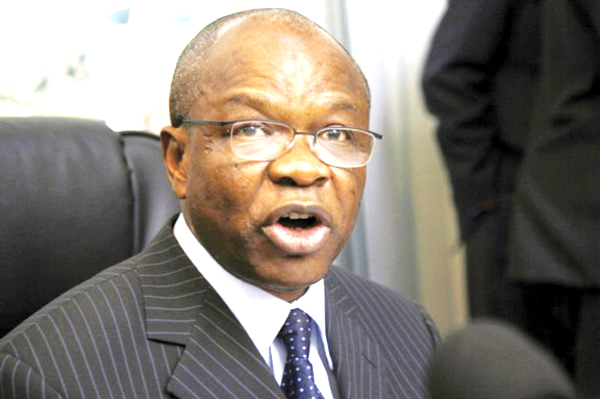Some stakeholders in the health sector have identified maternal and child health, cancer, infrastructure, research and funding as top priority for the two ministers in charge of the Ministry of Health.
They told the News Agency of Nigeria in Lagos that it was time to revamp the nation’s health sector, which was deteriorating.
Prof. Isaac Adewole and Dr. Osagie Ehanire were on November 11 sworn in as the Minister of Health and Minister of State for Health respectively, while Dr. Amina Shamaki was named the Permanent Secretary in the ministry.
A Professor of Pharmacognosy, Maurice Iwu, told NAN that the Federal Government needed to look into the medical research institutes and reposition them.
Iwu said: “We do not have enabling institutions capable of joining all the dots and there has to be such a centre.
“If you do not have an institution that does coordination for medical research, we will be working parallel and we will never meet.
“For example, a body like the Nigeria Institute of Medical Research has to be resuscitated to be able to play its critical role of research and documentation.
“The only way drug companies can be interested in investing in research is if there is something at the end of that research.”
Iwu said research without result was not useful and the only thing which made sense to scientific knowledge in the 21st century was for knowledge from different angles to be well coordinated.
According to Iwu, research is an expensive venture that is time consuming, but eventually leads to a result.
On his part, Prof. Akin Osibogun said the health sector was a shared responsibility among the government, communities, families as well as private and public stakeholders.
Osibogun, a former Chief Medical Director of the Lagos University Teaching Hospital, said: “We also have to work out a sustainable financing mechanism for health facilities to be revamped to render quality services.
“Without adequate funding, you cannot have an effective functional health service system.
“However, my advice to the Minister of Health is that he has to hit the ground running as we already have several reports on the shelf.”
Also, Biodun Owo, the Programmes Officer of the Development Communications Networks, said government should place priority on reproductive, maternal, newborn and child health.
According to Owo, maternal and child mortality are still high in Nigeria in spite of the efforts being made to tackle the problems.
He said: “A World Health Organisation 2013 Report shows that 40,000 women in Nigeria died as a result of pregnancy-related complications, with an underlying implication that 110 women died daily.
“A woman’s lifetime risk of dying from pregnancy or childbearing or related causes is one out of 13.
“Infant mortality rate is 69 deaths per 1,000 live births, while under-five mortality rate is 128 deaths per 1,000 live births.
“The percentage of births attended by skilled health personnel is 38.
“This should not be happening in a country that is rich in human and financial resources to put in place structures that will reduce these incidences.
“It is essential that the new heads of the health ministry put in place all that is needed to ensure that no one dies while giving birth.”
Prof. Olaoluwa Akinwale, the Head of Molecular Parasitology Research Laboratory Public Health Division of the Nigeria Institute of Medical research, also urged the Federal Government to give attention to parasitic diseases.
Akinwale said: “I will recommend that government looks into the area of funding for research and parasitic ailments and infections, especially malaria and the Neglected Tropical Diseases such as schistosomiasis and elephantiasis.
“Government should be able to make available basic facilities, especially to the poor people who suffer these infections.
“Amenities such as potable water, toilet facilities, good subsystem and functional clinics with qualified medical personnel in our communities are essential.
“This is such that even when these people that are infected are treated, they will not go back to the source of infections and the transmission will be reduced.”
Dr. Osahon Enabulele, the Vice President of the Commonwealth Medical Association, also shared his views on what the new ministers should do.
Enabulele said there were numerous challenges in the health sector for the ministers to address.
According to him, they should create an institution that is of an inclusive and participatory governance model in the health sector and show selfless commitment to the 2014 National Health Act.
He said: “They should also include strengthening, monitoring and evaluation of the institutions for delivering health services to Nigerians, while restoring public confidence, discipline, integrity, professionalism and best practices in Nigeria’s health institutions.
“The Universal Health Coverage in the country should be expanded by pursuing the much-awaited enactment of the National Health Insurance Commission Act.
“This can be done by strengthening the National Health Insurance Scheme.
“It should also include the scaling up of Community-Based Social Health Insurance component and the sincere exploration of other avenues to improve on the current dismal percentage of health coverage of Nigerians.
“The issue of medical tourism should be addressed, particularly via the implementation of the relevant provisions of the National Health Act.
“Also, the Nigeria’s Health Human Resource should be re-positioned with particular emphasis on the institution of robust and dynamic Health Human Resource Development Plan.”
Enabulele said this would help to address issues such as appropriate training, retraining, improved welfare and competitive wages for medical doctors and other health workers.
NAN.


